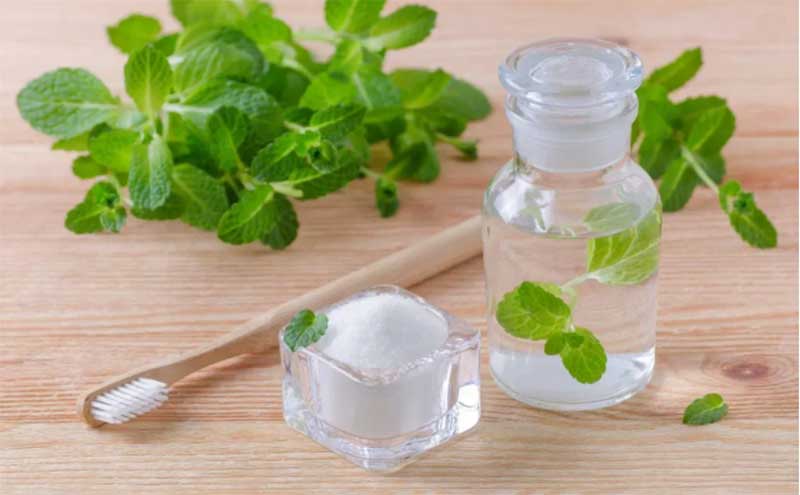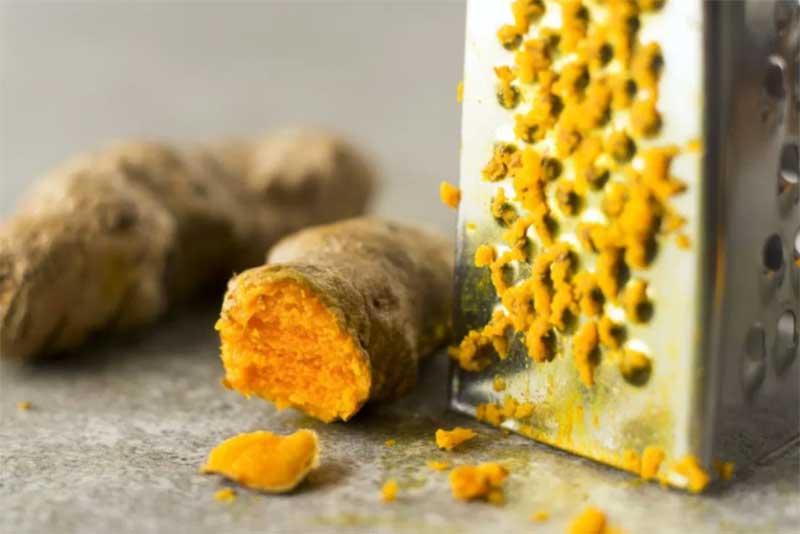Gingivitis is the earliest stage of gum disease, which in turn, can lead to tooth loss. Fortunately, gingivitis can be treated easily at home, but which home remedies work best?
Symptoms of gingivitis include red, swollen, inflamed gums that may bleed when a person brushes their teeth. Gingivitis is common, despite the fact that it is preventable.
This article explores the different home remedies available to treat gingivitis and the research to support their use. It also looks at gingivitis prevention, best practices for oral hygiene, and when to see a doctor.
Home Remedies
To avoid developing gum disease, people should treat the symptoms of gingivitis as soon as they notice them. A key sign is gums that bleed regularly when they are brushed or flossed.
People can try the following home remedies to treat gingivitis:
1. Saltwater Rinse
 |
| Home remedies for gingivitis include saltwater rinses, making mouthwash from natural ingredients, and oil pulling. |
Salt water has disinfectant qualities and can help the body to heal. Research has shown that rinsing the mouth with a saltwater solution can relieve inflamed gums caused by gingivitis.
To use a saltwater rinse:
- pour boiling water into a glass and let it cool to lukewarm
- mix 3/4 tsp of salt into the water
- swirl the saltwater rinse around the mouth
- spit the solution out
- repeat up to three times daily
2. Homemade Mouthwash
There are several types of homemade mouthwashes that people can mix to treat gingivitis. These include:
Lemongrass Oil Mouthwash – A 2015 study found lemongrass oil might be more effective at reducing gingivitis and the plaque that causes it than traditional mouthwash.
To make a lemongrass mouthwash, dilute 2 to 3 drops of lemongrass oil in water. Swirl around the mouth and then spit out. Repeat up to three times daily.
Aloe Vera Mouthwash – A 2016 study found that aloe vera was as effective as the active ingredient in traditional mouthwash at treating gingivitis symptoms.
Aloe vera juice does not need diluting and can be used on its own, so long as it is pure. Similarly to other mouthwashes, people should swirl it in the mouth and spit out then repeat up to three times daily.
Tea Tree Oil Mouthwash – A 2014 study found that tea tree oil mouthwash can reduce the bleeding associated with gingivitis significantly.
To make tea tree oil mouthwash, a person should simply add 3 drops of tea tree oil to a cup of warm water then use in the same way as the other homemade mouthwashes above.
Tea tree oil can interact with some medications, so it is best to speak to a doctor before using it for the first time.
Sage Mouthwash – A 2015 study found that the bacteria that cause plaque were significantly reduced by sage mouthwash.
To make sage mouthwash, add 2 tablespoons of fresh sage or 1 tablespoon of dried sage to boiling water. Simmer for 10 minutes, and then strain the mixture and leave to cool. Use the resulting liquid as with other homemade mouthwashes.
Guava Leaf Mouthwash – Studies have shown that guava leaf mouthwash can help to control plaque due to its antibacterial qualities. It may also reduce inflammation.
To make guava leaf mouthwash, people simply need to crush 6 guava leaves and add to 1 cup of boiling water. The resulting mixture should then be simmered for 15 minutes and left to cool. It can then be used, as with other homemade mouthwashes, after adding a small amount of salt.
3. Turmeric Gel
 |
| Turmeric gel may help to treat gingivitis. |
Turmeric is used in many home remedies as it has anti-inflammatory and anti-fungal properties. Research carried out in 2015 suggests that a gel containing turmeric can help prevent plaque and gingivitis.
Turmeric gel is available in many health food or alternative remedy shops. To use it to treat gingivitis, people should apply it to the gums and leave for 10 minutes before rinsing with water and spitting.
4. Oil Pulling
Oil pulling involves swirling oil around the mouth for up to 30 minutes. It may reduce bacteria in the mouth and combat the buildup of plaque that causes gingivitis.
To try oil pulling, people should put 2 teaspoons of oil in their mouth, swirl it around for 30 minutes, and then spit it out. They should then drink a glass of water before cleaning their teeth.
As it is quite difficult to keep oil in the mouth for this length of time, people may want to try shorter lengths of time at the start.
Oils that people can use for this treatment include:
- Coconut oil: Research has found this to reduce plaque and signs of gingivitis when used for oil pulling.
- Arimedadi oil: This has been shown to prevent plaque buildup and ease gingivitis symptoms.
With consistent care, there is a good chance of reversing gingivitis. If the problem does not improve with home remedies, you should see a dentist.
Causes
Gingivitis is an inflammation of the gums caused by a buildup of plaque on the teeth. Plaque is a sticky deposit that people can get rid of by cleaning their teeth properly.
Without proper oral hygiene, plaque can build up along the gum line. This leads to gingivitis, marked by inflamed gums that bleed when brushed.
If left untreated, gingivitis can lead to periodontitis. This more severe stage of gum disease causes the gums to recede. It can even wear away the surrounding bone, causing teeth to become wobbly. In severe cases, teeth may start to fall out.
Prevention
 |
| Going to the dentist regularly may help to prevent gingivitis. |
It is important to maintain good oral hygiene to prevent gingivitis. People should:
- brush their teeth for 2 minutes, twice daily
- floss daily to remove food particles that lead to bacteria and plaque buildup
- use mouthwash
- eat a low-sugar diet
- quit or avoid smoking
- use a soft-bristled toothbrush and replace it regularly
- use an electric toothbrush if possible
- have regular dental exams and cleanings
Best Practices: Brushing And Flossing
Sometimes, plaque builds up even when people brush and floss. This can happen if they are not brushing or flossing well. The buildup can lead to gingivitis.
Following best practices can help make sure brushing and flossing are effective.
How to Brush Teeth Properly
To brush their teeth thoroughly with a regular toothbrush, people should:
- hold their toothbrush at a 45-degree angle to the gums
- brush using short, circular strokes
- use medium pressure, holding the brush like a pen so as not to push too hard
- brush every side of each tooth
- brush for a minimum of 2 minutes, twice daily and after every sugary treat
How To Floss Properly
To floss thoroughly, people should:
- use 18 inches of floss
- keep the floss taut by winding it around a finger on each hand
- slide the floss between each tooth and along the gum line to form a c-shape
- unwind more fresh floss, as the process moves around the mouth
When To See A Doctor
If a person’s gums bleed when they brush their teeth or are red and inflamed, they may have gingivitis. They should ensure they are following oral hygiene best practices and try some of the home treatments above.
If home treatments do not work, it is important to see a doctor or dentist for advice. Additionally, if someone experiences severe swelling or bleeding in their gums, they should go straight to see their doctor or dentist.
A dentist will normally clean a person’s teeth, go over home care best practice, and may prescribe medicated mouthwash to treat gingivitis.
Sources:
- Beheshti-Rouy, M., Azarsina, M., Rezaie-Soufi, L., Alikhani, M. Y., Roshanaie, G., & Komaki, S. (2015, June). The antibacterial effect of sage extract (Salvia officinalis) mouthwash against Streptococcus mutans in dental plaque: A randomized clinical trial. Iranian Journal of Microbiology, 7(3), 173-177
https://www.ncbi.nlm.nih.gov/pmc/articles/PMC4676988/ - Dany, S. S., Mohanty, P., Tangade, P., Rajput, P., & Batra, M. (2015, October 1). Efficacy of 0.25% lemongrass oil mouthwash: A three arm prospective parallel clinical study. Journal of Clinical and Diagnostic Research, 9(10), ZC13-ZC17
https://www.ncbi.nlm.nih.gov/pmc/articles/PMC4625327/ - Huynh, N. C.-N., Everts, V., Leethanakul, C., Pavasant, P., & Ampornaramveth, R. S. (2016, July 21). Rinsing with saline promotes human gingival fibroblast wound healing in vitro. PLoS One, 11(7)
http://journals.plos.org/plosone/article?id=10.1371/journal.pone.0159843 - Peedikayil, F. C., Sreenivasan, P., & Narayanan, A. (2015, March-April). Effect of coconut oil in plaque related gingivitis – A preliminary report. Nigerian Medical Journal, 56(2), 143-147
https://www.ncbi.nlm.nih.gov/pmc/articles/PMC4382606/ - Rahman, B., Alkawas, S., Al Zubaidi, E. A., Adel, O. I., & Hawas, N. (2014, October-December). Comparative antiplaque and antigingivitis effectiveness of tea tree oil mouthwash and a cetylpyridinium chloride mouthwash: A randomized controlled crossover study. Contemporary Clinical Dentistry, 5(4), 466-470
https://www.ncbi.nlm.nih.gov/pmc/articles/PMC4229754/ - Ravi, K., & Divyashree, P. (2014). Psidium guajava: A review on its potential as an adjunct in treating periodontal disease. Pharmacognosy Review, 8(16), 96-100
https://www.ncbi.nlm.nih.gov/pmc/articles/PMC4127827/ - Singh, V., Pathak, A. K., Pal, M., Sareen, S., & Goel, K. (2015, January-June). Comparative evaluation of topical application of turmeric gel and 0.2% chlorhexidine gluconate gel in prevention of gingivitis. National Journal of Maxillofacial Surgery, 6(1), 67-71
https://www.ncbi.nlm.nih.gov/pmc/articles/PMC4668736/ - Vangipuram, S., Jha, A., & Bhashyam, M. (2016, October 1). Comparative efficacy of aloe vera mouthwash and chlorhexidine on periodontal health: A randomized controlled trial. Journal of Clinical and Experimental Dentistry, 8(4), e422-e447
https://www.ncbi.nlm.nih.gov/pmc/articles/PMC5045693/
Important Notice: This article was originally published at www.medicalnewstoday.com by Lana Burgess where all credits are due. Medically reviewed by Christine Frank, DDS.
Disclaimer
The watching, interacting, and participation of any kind with anything on this page does not constitute or initiate a doctor-patient relationship with Dr. Farrah®. None of the statements here have been evaluated by the Food and Drug Administration (FDA). The products of Dr. Farrah® are not intended to diagnose, treat, cure, or prevent any disease. The information being provided should only be considered for education and entertainment purposes only. If you feel that anything you see or hear may be of value to you on this page or on any other medium of any kind associated with, showing or quoting anything relating to Dr. Farrah® in any way at any time, you are encouraged to and agree to consult with a licensed healthcare professional in your area to discuss it. If you feel that you’re having a healthcare emergency, seek medical attention immediately. The views expressed here are simply either the views and opinions of Dr. Farrah® or others appearing and are protected under the first amendment.
Dr. Farrah® is a highly experienced Licensed Medical Doctor certified in evidence-based clinical nutrition, not some enthusiast, formulator, or medium promoting the wild and unrestrained use of nutrition products for health issues without clinical experience and scientific evidence of therapeutic benefit. Dr. Farrah® has personally and keenly studied everything she recommends, and more importantly, she’s closely observed the reactions and results in a clinical setting countless times over the course of her career involving the treatment of over 150,000 patients.
Dr. Farrah® promotes evidence-based natural approaches to health, which means integrating her individual scientific and clinical expertise with the best available external clinical evidence from systematic research. By individual clinical expertise, I refer to the proficiency and judgment that individual clinicians acquire through clinical experience and clinical practice.
Dr. Farrah® does not make any representation or warranties with respect to the accuracy, applicability, fitness, or completeness of any multimedia content provided. Dr. Farrah® does not warrant the performance, effectiveness, or applicability of any sites listed, linked, or referenced to, in, or by any multimedia content.
To be clear, the multimedia content is not intended to be a substitute for professional medical advice, diagnosis, or treatment. Always seek the advice of your physician or other qualified health provider with any questions you may have regarding a medical condition. Never disregard professional medical advice or delay in seeking it because of something you have read or seen in any website, video, image or media of any kind.
Dr. Farrah® hereby disclaims any and all liability to any party for any direct, indirect, implied, punitive, special, incidental, or other consequential damages arising directly or indirectly from any use of the content, which is provided as is, and without warranties.








